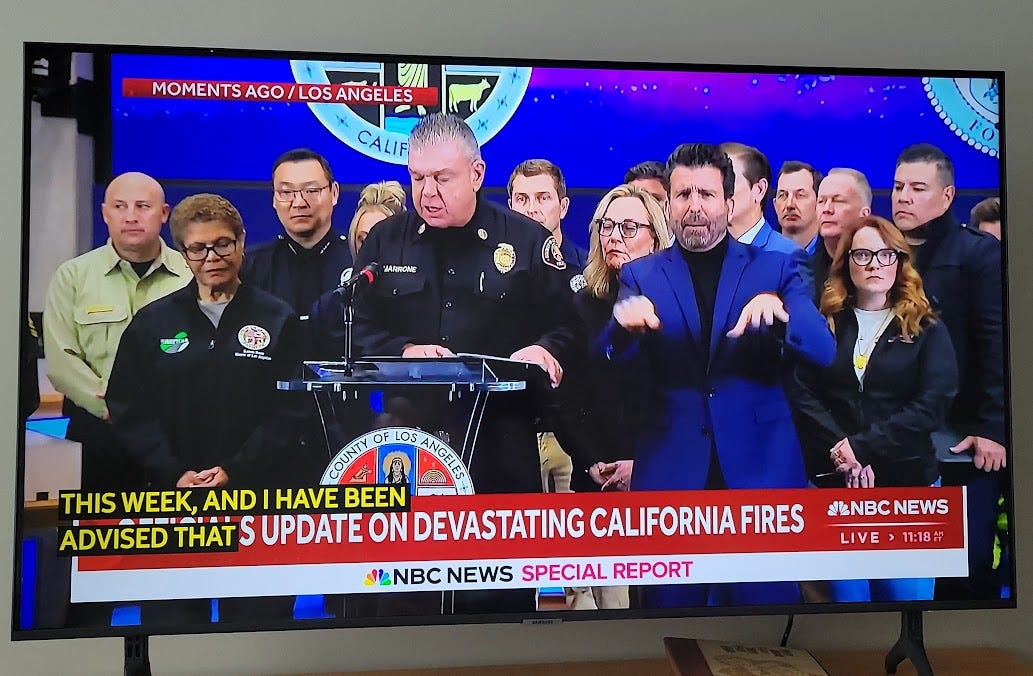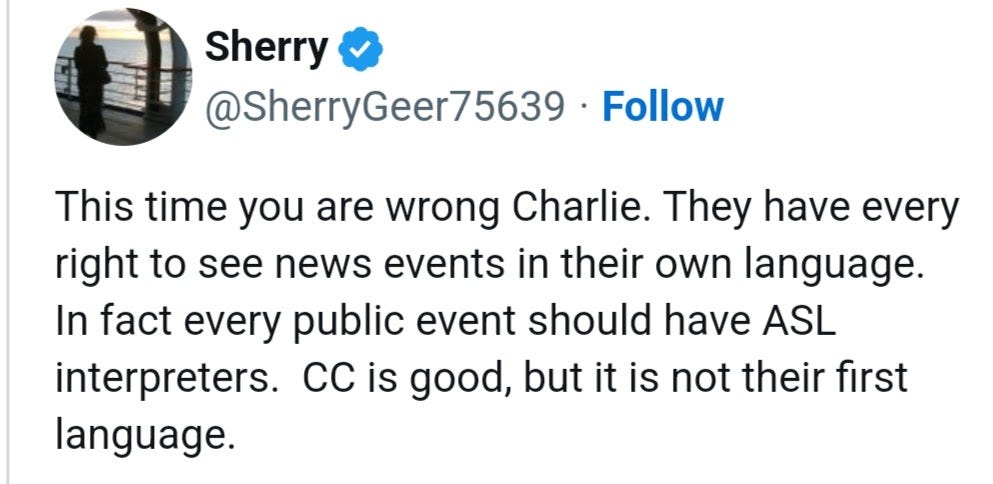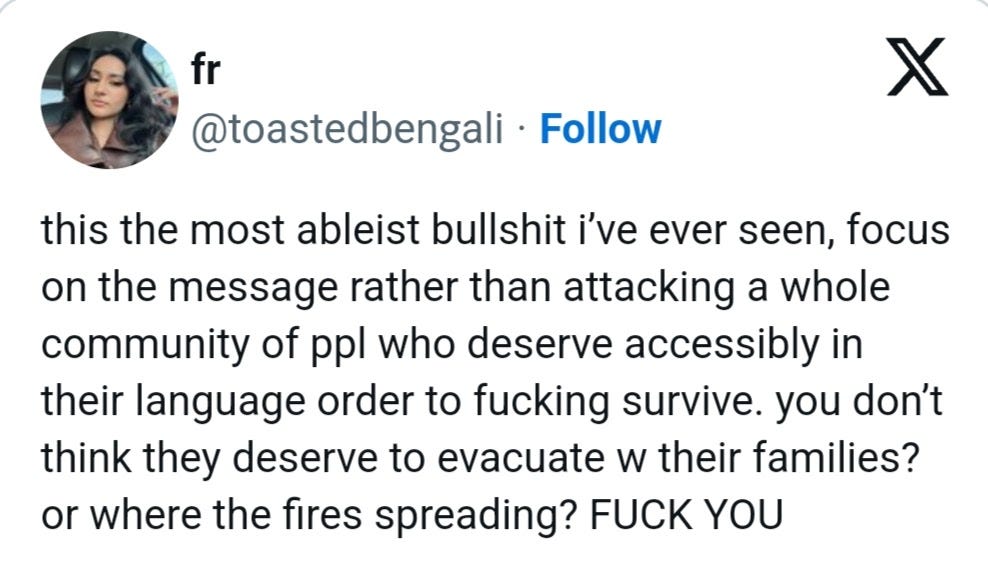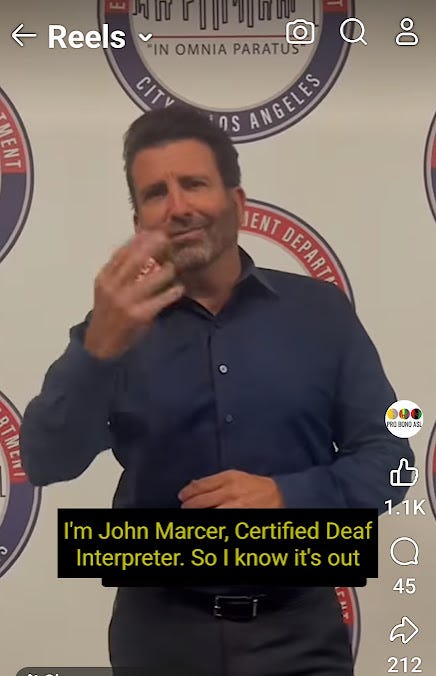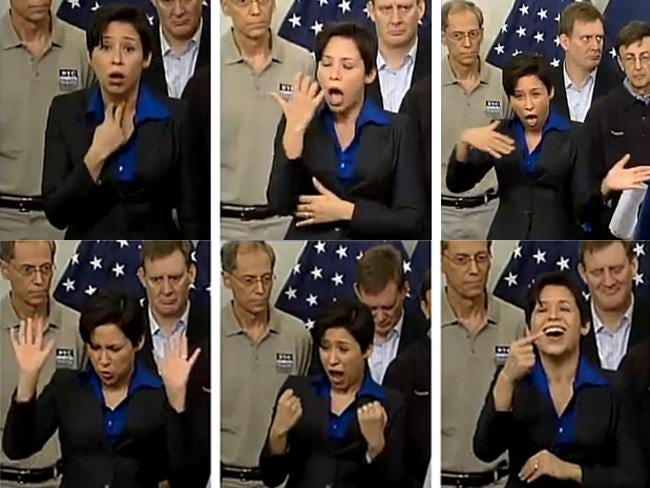"Eliminating Sign Language Interpreters During Emergency Briefings"???
On January 8, Charlie Kirk, the Turning Point USA founder and broadcaster, posted on Twitter/X:
“Okay, seriously, can we stop giving half the screen during these crisis briefings to sign language interpreters? Closed captioning exists. I have nothing against the hearing impaired of course, but this is a joke.”
HEARING IMPAIRED??? It is a term that many deaf and hard-of-hearing people consider to be “negative” and outdated.
Hearing-impaired – This term is no longer accepted by most in the community but was at one time preferred, largely because it was viewed as politically correct. To declare oneself or another person as deaf or blind, for example, was considered somewhat bold, rude, or impolite. At that time, it was thought better to use the word “impaired” along with “visually,” “hearing,” “mobility,” and so on. “Hearing-impaired” is a well-meaning term that is not accepted or used by many deaf and hard-of-hearing people. For many people, the words “deaf” and “hard of hearing” are not harmful. Instead, the term “hearing-impaired” is viewed as negative. The term focuses on what people can’t do. It establishes the standard as “hearing” and anything different as “impaired,” or substandard, hindered, or damaged. It implies that something is not as it should be and ought to be fixed if possible. To be fair, this is probably not what people intended to convey by the term “hearing impaired,” wrote the National Association of the Deaf.
Later that same day, in his show, “The Charlie Kirk Show,” Charlie Kirk told his audience:
I'm gonna say this just off the cuff before I introduce our guest. Can we please just go away with half the screen during these emergency briefings to the sign language interpreters? I have nothing against, obviously, people that cannot hear, but there's closed captioning. I mean, this is just over the top. We can't do this. We gotta get back to how it used to be. It's just, oh, it's just too much. It's a distraction is what it is. The reason is they do these emergency briefings for fires or terrorist attacks, and you're looking at this and you're not listening. I don't like it. So we got — we just gotta — closed captioning's perfectly fine. I think we have to — we gotta get back to basics here.
Two days later, on January 10, a political activist, Christopher F. Rufo, posted on Christopher F. Rufo posted on Twitter/X:
I'm sorry, but we have to stop with the ridiculous sign language interpreters, who turn serious press conferences into a farce. There are closed captions on all broadcast channels and streaming services. No wild human gesticulators necessary.I'm sorry, but we have to stop with the ridiculous sign language interpreters, who turn serious press conferences into a farce. There are closed captions on all broadcast channels and streaming services. No wild human gesticulators necessary.
Then he added:
Deaf friends: Am I missing something? Is closed captioning not sufficient? Why did these live interpreters suddenly appear everywhere, right at the moment in which CC and AI made this obsolete?
Yesterday my non-deaf disability advocate in California texted me, “Howie, militarize your advocates and go get this son of a bitch [Rufo] on X.” I replied, “Many deafies posted it on their Facebook pages.”
~~~~~~~~~~ TIME OUT ~~~~~~~~~~
I have no idea what caused Kirk and Rufo to be nuts about this issue.
No surprise to me. Deafies responded:
Watch the Daily Moth video on what Marlee Matlin, who was the first Deaf actor to win an Oscar in 1987, received the Best Actress award for Children of a Lesser God, pushed back on criticism from commentator Charlie Kirk.
The National Association of the Deaf drummed loudly with its open letter to Kirk:
Dear Mr. Kirk,
We at the National Association of the Deaf (NAD) are writing in response to your recent comments regarding sign language interpreters during emergency briefings. While we respect your right to share your views, we feel compelled to address several misconceptions in your statement about accessibility for the deaf and hard-of-hearing community.
Your suggestion that closed captioning alone is sufficient overlooks critical aspects of deaf communication and accessibility.
First, American Sign Language (ASL) is a distinct language from English, with its own grammar, syntax, and cultural context. Many deaf individuals use ASL as their primary language and may have limited English proficiency. Reading and trying to understand closed captions in English during time-sensitive emergency situations can be challenging and potentially dangerous for these deaf community members.
Second, sign language interpreters provide crucial visual context, emotional nuance, and cultural mediation that captions alone cannot convey. This real-time interpretation can be life-saving during emergencies, when clear and immediate understanding is vital.
To understand our perspective, consider this: imagine watching an emergency broadcast with the audio completely muted, relying solely on closed captioning while an ASL interpreter signs the message. As a hearing person, you might find yourself struggling to follow along while feeling that significant context is missing from your usual way of receiving information. This is similar to what deaf individuals experience when they have access only to closed captioning without ASL interpretation. Just as you rely on audio for complete understanding, many deaf individuals rely on ASL for full comprehension.
Third, your characterization of interpreters as “distracting” fails to recognize that their presence is not a matter of preference but of essential access. Just as emergency broadcasts provide audio for hearing viewers, ASL interpretation ensures equal access to critical information for deaf and hard-of-hearing viewers.
The Americans with Disabilities Act (ADA) mandates equal access to public services and information. Sign language interpreters during emergency briefings are not “over the top” but rather represent the bare minimum of inclusive emergency communication.
We invite you to learn more about our community and why sign language interpretation is crucial. The NAD would welcome the opportunity to engage with you in a constructive dialogue about how emergency communications can best serve all Americans, including the estimated 48 million deaf and hard-of-hearing individuals in our country.
Accessibility is not a distraction—it is an essential human right and a critical matter of public safety. Language rights are not optional; they are fundamental to the dignity and equality of all people. Denying access is not just a technical or logistical failure, it is a violation of human rights. Language rights are human rights.
Sincerely,
Lisa M. Rose, President
The National Association of the Deaf Board of Directors
cc: Deaf and hard of hearing communities across the United States of America
Certified Deaf Interpreter John Maucere released his Facebook reel yesterday:
I’m John Maucere, Certified Deaf Interpreter. So, I know it’s out there right now. And people are saying, yeah, especially hearing people. I’m saying, “Why do we have the sign language interpreters, or ASL Interpreters on stage during the press conferences. It’s distracting. Captions will do. “Okay, the point of captions - spelling out the English word - most deaf (not all) people’s first language, is actually sign language, ASL. So, to Deaf people, including myself, English is my second language. So I have to do the mental… I have to take the mental load of figuring out this second language, and sometimes it’s easier to misunderstand. I get no tone (of voice). It’s a monotone language if I’m reading. So, have an ASL interpreter on stage or within the screen. I understand it more and more quickly. Most Deaf people prefer sign language and that is just equal accessibility for all humans. So, I hope you guys will understand our needs.
Thanks, John, for giving your excellent advice.
As of this writing, Kirk has not yet responded to the criticism.
FLASHBACK
I guess Charlie Kirk and Christopher Rufo do not know about Lydia Callis.
Callis became an internet sensation overnight after interpreting for New York Mayor Michael Bloomberg in his press conference during Hurricane Sandy in 2012.
Callis’ super-extra facial expressions and gestures have influenced most governors’ and mayors’ interpreters during the daily COVID-19 updates.
Read my Maryland Matters commentary from April 14, 2020 - Can’t Stop Watching the Sign Language - to learn more about Callis and other interpreters.
Now, you can show your facial expressions and gestures to Kirk and Rufo-!!!


